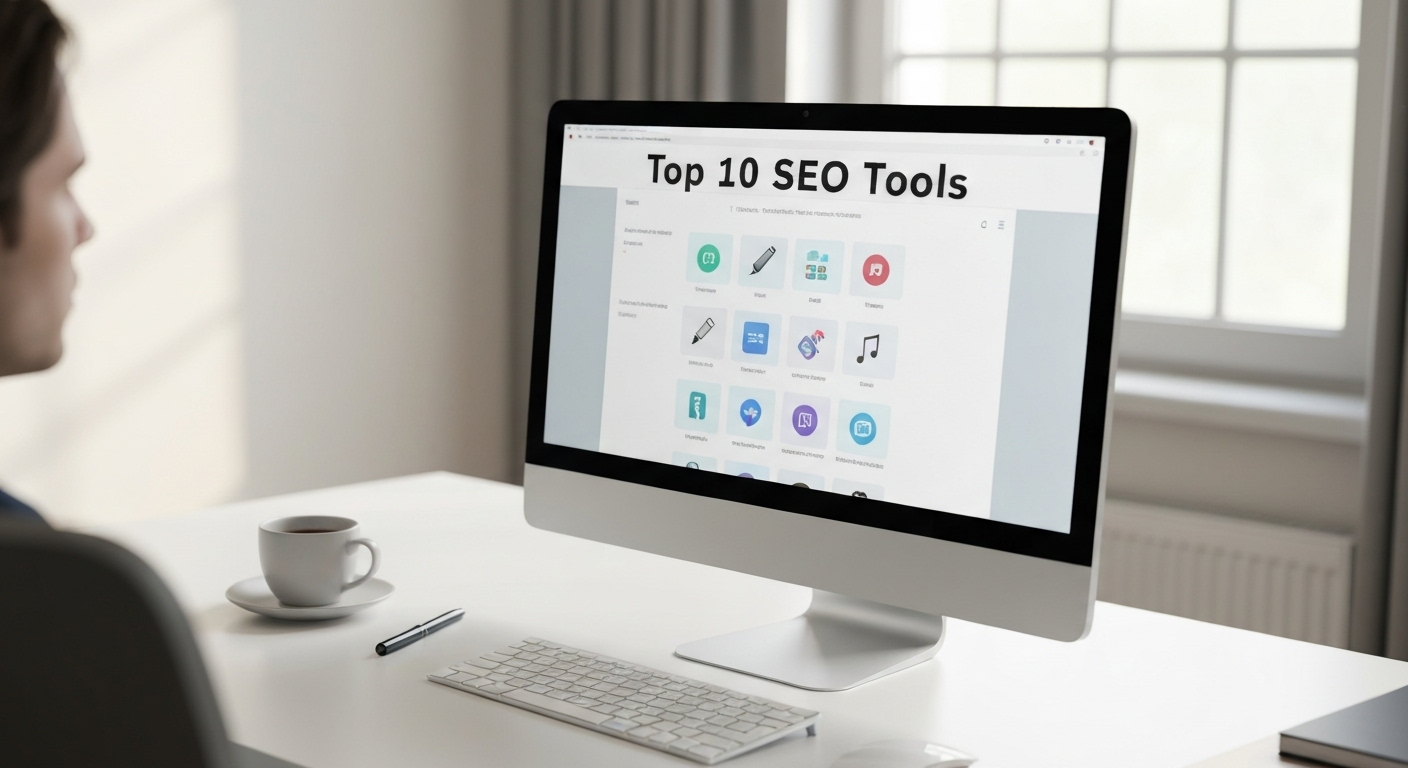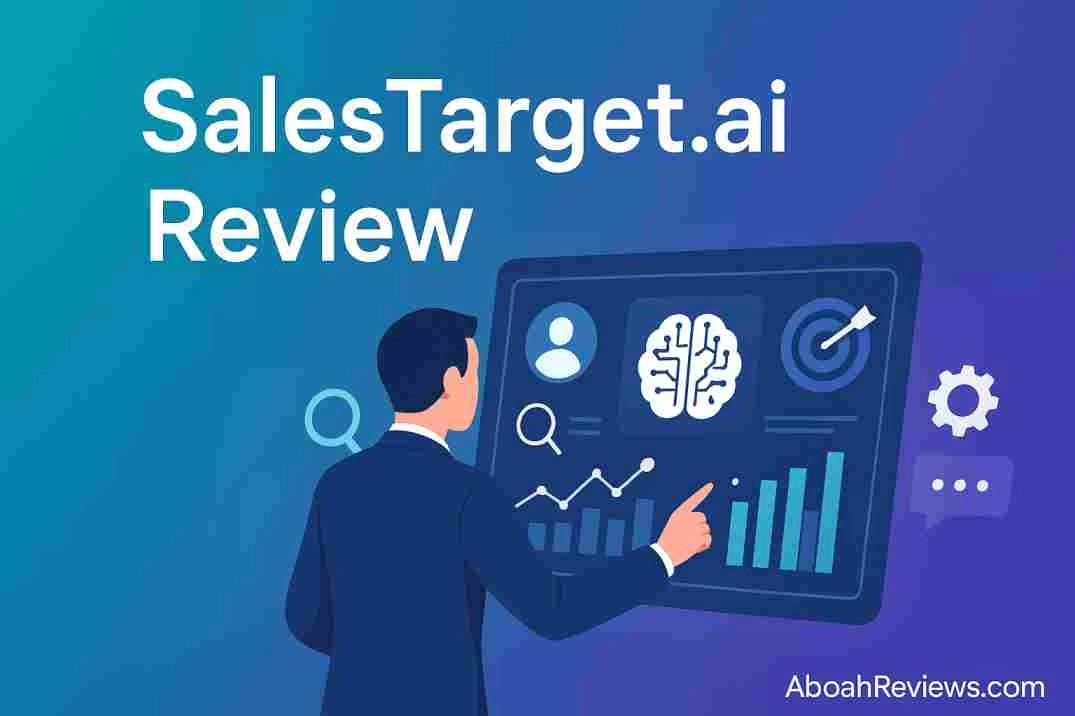What Are SEO Tools?

Have you ever wondered how some websites magically appear at the very top of a Google Search? It’s not magic; it’s search engine optimization (SEO), and a big part of it involves using the right SEO tools.
I remember when I first started, I was totally lost. But over the four ten years, I’ve figured out which seo tools work, helping my clients get over 150,000 visitors a month. Ready to learn my secrets? Let’s get started.
Key Highlights
- SEO tools are special software helpers that make your website easier for Google to find.
- They assist with key search engine optimization tasks like keyword research and technical SEO.
- Using a tool like Google Search Console is a great way to get real data from Google for free.
- These tools help you understand what your visitors and competitors are doing online.
- By using the right seo tools, you can improve your content, fix website issues, and track your success.
- Ultimately, seo tools save you time and help more people discover your website through Google Search.
What Are SEO Tools? An Easy Introduction
 So, what is an SEO tool, really? Think of it like a special helper for your website. Its job is to help you figure out how to show up higher in search engine results, like on Google Search. These tools give you clues and ideas to build a winning SEO strategy.
So, what is an SEO tool, really? Think of it like a special helper for your website. Its job is to help you figure out how to show up higher in search engine results, like on Google Search. These tools give you clues and ideas to build a winning SEO strategy.
Some tools help you find the secret words people are typing into Google, while others check if your website is healthy and easy for Google to read. They are your assistants for making your website more visible online.
Why Every Beginner Needs SEO Tools
When you’re just starting, trying to understand SEO can feel like trying to solve a giant puzzle, right? That’s where an SEO tool comes in to save the day.
I remember feeling so overwhelmed, but tools made everything click. They help you do keyword research to find what your audience is actually looking for.
These tools also help you understand search intent, which is just a fancy way of saying “what someone really wants when they search for something.” Do they want to buy something, or just learn? Knowing this helps you create content that people love.
Plus, an SEO tool can point out simple mistakes on your website that might be hurting your ranking. They guide you toward best practices for a better user experience, making your site friendly for both visitors and search engines. It’s like having a guide who knows the way.
How SEO Tools Help Websites Grow
Have you ever planted a seed and watched it grow? SEO tools are like the water and sunshine for your website’s growth. They are a core part of any good search engine optimization and content marketing plan.
They help you get more visitors from organic search, which means people find you naturally on Google Search without you paying for ads.
For example, a free tool like Google Keyword Planner can show you how many people are searching for a specific topic. I use it all the time to decide what to write about next. It gives me real numbers, so I’m not just guessing what people are interested in.
By using these insights, you can create content that people are actively looking for. This brings more visitors to your site, which helps it grow bigger and stronger over time. Isn’t that what we all want for our websites?
The Role of SEO Tools in Ranking #1 on Google
Getting to that number one spot on Google Search feels amazing, trust me! But it rarely happens by accident. SEO tools play a huge part in that journey by giving you the information you need to climb to the top of the search results. How do they do that?
First, they help you monitor your SEO performance. You can see which pages are doing well and which ones need a little love.
Tools that perform site audits act like a doctor for your website, finding technical problems that could be holding you back. I once found a simple error on a client’s site that, once fixed, shot their traffic up!
They also offer rank tracking, so you can watch your website move up (or down) for your most important keywords. This helps you know if your strategy is working or if you need to make a change. It’s like having a scoreboard for your SEO game.
Benefits of Using SEO Tools for Website Success
 Using an SEO tool isn’t just about finding keywords; it brings so many good things to your website. These helpers make your content creation smarter by showing you what topics people care about and helping you understand user intent.
Using an SEO tool isn’t just about finding keywords; it brings so many good things to your website. These helpers make your content creation smarter by showing you what topics people care about and helping you understand user intent.
They also make technical tasks like site audits and rank tracking much simpler.
Think of it this way: you could try to build a house with just your hands, or you could use a hammer and saw. SEO tools are your hammer and saw for building a successful website. Let’s look at some of the biggest benefits you’ll get.
1. Improved Keyword Targeting
Have you ever tried to guess what gift a friend wants for their birthday? It’s tough, right? Trying to guess what people search for is just as hard.
A keyword research tool takes the guesswork out of finding the perfect target keyword. It shows you exactly what search query people are using.
I love using tools like the Google Keyword Planner because they give me real data. Instead of hoping people are searching for “cool blue shoes,” I can see that they are actually searching for “best running shoes for men.” This helps me focus my efforts on what truly matters to my audience.
Understanding the search intent behind a keyword is also super important. Does someone want to buy something or just learn? A good keyword research tool helps you figure this out, so you can create content that directly answers their needs.
2. Data-Driven Decision Making Made Simple
Making decisions based on feelings can be risky. What if you feel like a blog post will be popular, but nobody reads it? That’s why I rely on data.
Tools like Google Analytics provide valuable insights into your website’s SEO performance, so you can make choices based on facts, not guesses.
For example, I can see which pages get the most visitors and how long people stay on them. If a page has a lot of visitors but people leave quickly, that’s a clue that something needs to be improved. This data tells me exactly where to focus my attention.
Some tools even have an AI assistant that can analyze the data for you and give you suggestions. Even data from a Google Ads account can give you clues for SEO. It’s like having a smart friend who helps you understand what all the numbers mean.
3. Faster Website Audits and Quick Fixes
Checking your website for problems can be a huge headache if you do it manually. I remember spending days looking for broken links on a big site. It was so boring. But with seo audit tools, you can run site audits in just a few minutes.
These tools are experts at spotting technical SEO issues. Are there broken pages? Do you have duplicate content that’s confusing Google? The tool will create a list of problems for you to fix. It’s like a to-do list for making your website healthier.
Many of these tools even tell you how to fix the problems and explain the best practices. This is a great way to learn as you go.
For small businesses, free tools like Bing Webmaster Tools can be surprisingly good at finding these technical errors without costing a dime.
4. Better Content Optimization Using SEO Tools
Writing a blog post is one thing, but making sure Google understands it is another. This is where content optimization tools come in. I use them for every piece of content I write. They help me make sure my articles are as search-engine-friendly as possible.
These tools analyze the top-ranking pages for your keyword and give you suggestions. They might recommend a certain word count, suggest you add specific related keywords, or help you organize your ideas into topic clusters.
They even help with things like writing catchy meta descriptions that make people want to click.
I personally use a tool called Surfer SEO. I write my article, and it gives me a score and tells me what to add to make it even better. It’s like having an editor who knows exactly what Google wants to see. It’s a great way to turn an 80% good article into a 100% perfect one.
5. Enhanced User Experience for Your Visitors
Have you ever visited a website that was slow or confusing? You probably left right away, didn’t you? A good user experience is super important, and SEO tools can help you improve it. Happy visitors mean happy Google.
Some tools check for technical SEO issues that affect how people use your site. For example, they can check your Core Web Vitals, which are signals that tell Google if your site is fast and easy to use. A slow site can really hurt your rankings.
They also help with on-page elements like clear page titles and headings, which make your content easier to read for both humans and search engines.
Following these best practices makes your site a more pleasant place for everyone, which can lead to more traffic and better rankings.
6. Saving Time and Cutting Costs
My time is valuable, and I bet yours is too! SEO tools are amazing time-savers. Imagine trying to manually track your keyword rankings every day or finding all your competitors’ backlinks by hand. It would take forever. These tools automate those tasks so you can focus on more important things.
Many of the best SEO tools offer a free version or a free trial. This is awesome because you can try them out without having to pull out your credit card.
I always tell beginners to start with the free SEO tools first, like Semrush free plan or Google Keyword Planner. It gives you so much information directly from Google at no cost.
Even the paid tools often save you money in the long run. The time they save and the extra traffic they help you get are often worth much more than the subscription cost. It’s an investment in your website’s future.
7. Stronger Reporting and ROI Tracking
How do you know if all your SEO hard work is actually paying off? You need good reports. SEO reporting tools help you track your progress and show your success. If you work for a marketing agency like I used to, clear reports are essential for keeping clients happy.
I love using tools like Google Analytics 4 (GA4) and Looker Studio to create custom dashboards. These tools give you solid data on your traffic, conversions, and more. You can see exactly which blog posts are bringing in the most visitors or making the most sales.
This information is gold! It helps you prove that your SEO efforts are generating a return on investment (ROI). With Google Analytics, you can connect your SEO traffic to real business goals, which is something every boss or client wants to see.
8. Gaining Competitor Insights Easily
Wouldn’t it be great if you could peek at your competitor’s playbook? With the right SEO tool, you can. Competitor analysis is one of my favorite things to do. It helps me understand what’s working for others in my space so I can learn from them.
Tools like Ahrefs and SEMrush are fantastic for this. You can type in a competitor’s website and see which keywords they rank for, where they get their backlinks, and which of their pages get the most traffic.
It’s like being a detective for your industry. This is a huge advantage for any digital marketing agency or business.
While your Search Console only shows data for your own site, these other tools fill in the gaps. By studying your competitors’ content marketing strategies, you can find opportunities they might have missed. It’s a great way to get a competitive edge.
9. Managing Backlinks Effectively
Think of backlinks as votes of confidence from other websites. The more high-quality votes you have, the more Google trusts you. But managing them can be tricky. This is where backlink analysis tools are a lifesaver for your link building efforts.
Tools like Ahrefs and Majestic SEO are my go-tos for this. They show you every website that links to you. They also help you check the quality of those links. A link from a trusted site is great, but a link from a spammy site can actually hurt your SEO ranking.
These tools also let you spy on your competitors’ backlinks. Where are they getting their links from? Maybe you can get a link from the same place. This is a huge part of a strong technical SEO and content creation strategy. You can’t just write great stuff; you need people to see it and link to it.
10. Keeping Track of Rankings Over Time
Are you moving up or down in the search engine results? If you’re not tracking your rankings, you’re just guessing. A rank tracking tool is like a daily report card for your website. It shows you exactly where you stand for your most important keywords.
Using a tracking tool like SERPWatcher or Nightwatch is simple. You just enter the keywords you want to track, and the tool checks your position in Google every day. This gives you valuable keyword data and helps you see trends over time. Is a new blog post starting to climb? Did an old one suddenly drop?
This information is important for measuring your SEO performance. When I see a keyword start to drop, I know it’s time to update that page with fresh content. Without rank tracking, I would have no idea that there was a problem until my traffic started to disappear.
Types of SEO Tools Explained for Beginners
 Not every SEO tool does the same thing. They are like different tools in a toolbox. You have hammers, screwdrivers, and wrenches, and you use each one for a specific job.
Not every SEO tool does the same thing. They are like different tools in a toolbox. You have hammers, screwdrivers, and wrenches, and you use each one for a specific job.
SEO tools are specialized for tasks like keyword research, technical SEO, content optimization, and on-page SEO.
Understanding the different types will help you pick the right one for what you need to do. Are you looking for blog post ideas? Or do you need to fix a broken part of your website? Let me break down the main categories so you know what’s what.
1. Keyword Research Tools for Finding Keywords
Keyword research tools are your treasure maps for finding golden keywords. Their job is to help you discover what words and phrases people are typing into search engines. This helps you find the perfect target keyword for your next piece of content.
These tools work by analyzing huge amounts of search data. They can tell you how many people search for a keyword each month and how difficult it is to rank for.
Some of the best free keyword research tools, like Google Keyword Planner and even just Google Autocomplete, are great for beginners. I found some of my highest-traffic keywords just by typing a word into Google and seeing what it suggested!
I also use Google Trends to see if a keyword is becoming more or less popular over time. Understanding this and the search intent behind a query is key. These tools give you the clues you need to create content that people are actively looking for.
2. Technical SEO Tools for Site Health
Technical SEO sounds scary, but it’s just about making sure your website’s foundation is strong. Technical SEO tools are like a doctor for your website. They perform site audits to check for problems that could be hurting your health in the eyes of Google.
These tools look for things like slow page speed, broken links, and other issues that can affect your Core Web Vitals. I once saved a client’s homepage from disappearing from Google because a tool called Screaming Frog found a “noindex” tag that was accidentally added. It was a huge relief!
Free tools like Google Search Console and Bing Webmaster Tools are surprisingly powerful for this. They will alert you to many common technical problems. Keeping your site technically healthy is a basic but super important part of SEO.
3. Content Optimization Tools for Better Writing
Have you ever stared at a blank page, not knowing what to write? Content optimization tools are amazing helpers for your content creation process. They don’t just help you write; they help you write content that is designed to rank well in search results.
These tools analyze the top-ranking articles for your topic and give you a recipe for success. They suggest which related keywords to include, how long your article should be, and what questions you should answer. This helps you create comprehensive articles organized into logical topic clusters.
They can also help you avoid issues like duplicate content and give you tips for writing better titles and meta descriptions. I use these tools to refine my writing and make sure I’ve covered a topic thoroughly. They help me publish content with confidence, knowing it has a great chance to succeed.
4. Rank Tracking Tools to Watch Your Progress
After all your hard work, you need to know if it’s paying off, right? Rank tracking tools are your scoreboard. They automatically check your position in the search engine results every day for the keywords you care about, which directly impacts your SEO ranking.
Using them is easy. You just pop in your list of keywords, and the tool does the rest. It will show you a graph of your progress over time. Seeing a keyword climb from page 10 to page 1 is one of the best feelings in SEO!
While Google Search Console gives you average position data, dedicated rank trackers are often more precise and update more frequently.
You can also connect them to your Google Analytics account to see how your rankings affect your traffic. This helps you connect the dots between your actions and your results.
5. Backlink Analysis Tools for Link Building
Link building is a huge part of SEO, but it can feel like a mystery. Backlink analysis tools pull back the curtain and show you exactly what’s going on. They let you see every single website that is linking to you and your competitors.
Why is this so useful? First, you can check the quality of your own backlinks. Are they helping or hurting you? Second, you can do competitor analysis to find link-building opportunities.
If a popular blog linked to your competitor, maybe they would be willing to link to your awesome content too.
These tools are essential for any serious SEO strategy. They work alongside your other technical SEO and SEO audit tools to give you a complete picture of your site’s authority. My favorites for this are Ahrefs and Majestic.
6. Local SEO Tools to Boost Local Searches
If you have a local business, like a pizza shop or a hair salon, you need people in your town to find you. That’s where local SEO tools come in. They are specially designed to help you show up in local search engine results, like on Google Maps.
A huge part of this is managing your Google Business Profile. Tools like BrightLocal help you keep your information consistent everywhere online, manage customer reviews, and track your local rankings. This is so important for building trust with local customers.
These tools combine features like rank tracking for specific zip codes and citation management to make your content marketing efforts more effective at a local level.
For e-commerce sites like Shopify, many all-in-one tools have features for you, but local SEO tools are really for businesses with a physical location.
7. Analytics and Reporting Tools for Results
How do you prove your SEO is working? With data. Analytics and reporting tools are essential for tracking your success and showing the value of your work.
As someone who has worked at a marketing agency, I can tell you that clients love seeing clear, easy-to-understand reports.
Google Analytics, especially the new GA4, is the king of analytics. It gives you solid data on who is visiting your site, how they found you, and what they do once they’re there. I use it to see which search terms are driving the most traffic and which pages are leading to sales.
You can also use tools like Looker Studio to create beautiful, custom dashboards. You can pull in data from Google Analytics and other sources to create one single report that tells the whole story. It makes reporting so much easier and more professional.
8. On-Page SEO Tools for Page Improvements
On-page SEO refers to all the things you do directly on your webpage to help it rank better. An on-page SEO tool helps you get these details right. It’s like a checklist to make sure each page is perfectly optimized.
These tools often come as plugins for your website, like Yoast SEO for WordPress. They give you simple, color-coded feedback as you write.
They’ll help you optimize your title tags and meta descriptions to make them more clickable in search results.
They also help with your overall content optimization by reminding you to use your target keyword, add images, and link to other pages on your site. For beginners, a tool like this is an amazing teacher. It guides you through the basics of on-page SEO one page at a time.
9. All-in-One SEO Platforms for Everything You Need
Feeling overwhelmed by all the different types of tools? I get it. That’s why all-in-one SEO platforms are so popular. They try to combine almost everything you need into a single SEO tool. Think of it as a Swiss Army knife for SEO.
Platforms like Ahrefs and SEMrush are great examples. With one subscription, you get a keyword research tool, competitor analysis features, rank tracking, site audits, and reporting tools. Many are now even including an AI assistant to help you make sense of the data.
While they can be more expensive, they are often a great value if you plan on using most of the features. They simplify your workflow because you don’t have to jump between a dozen different tools.
For anyone serious about SEO, an all-in-one platform is often a worthwhile investment.
Top 10 SEO Tools to Know in 2025
 Okay, so we’ve talked about what SEO tools are and the different types. Now for the fun part, I’m going to share the top 10 tools that I personally use and recommend. Sticking to best practices in search engine optimization is easier when you have the right SEO tools.
Okay, so we’ve talked about what SEO tools are and the different types. Now for the fun part, I’m going to share the top 10 tools that I personally use and recommend. Sticking to best practices in search engine optimization is easier when you have the right SEO tools.
This list includes everything from a powerful keyword research tool to some of the best free SEO tools out there. These are the tools that have helped me get real results for my clients and my own blog. Let’s get into it.
1. Ahrefs – Best for Keyword Research
If I could only pay for one SEO tool, it would probably be Ahrefs. I use it almost every single day. While I think it’s the best for keyword research and competitor analysis, it’s also amazing for backlink analysis.
What I love about Ahrefs is its Site Explorer feature. You can plug in any website – yours or a competitor’s – and get a ton of information. You can see what keywords they rank for, which pages get the most traffic, and who is linking to them. It’s incredibly powerful for building out your content marketing strategy.
Ahrefs isn’t the cheapest tool out there, but the data is some of the most accurate you can get without having access to a site’s private analytics. It’s great for beginners and experts alike and is a staple in the SEO world.
2. Yoast SEO – For On-Page Optimization
If your website is built on WordPress, then you need to know about Yoast SEO. It’s a plugin that makes on-page SEO super simple. I recommend it to all my clients who use WordPress. It’s like having a little SEO coach right there on your page as you write.
Yoast gives you a simple checklist for each page and post. It helps you with your content optimization by reminding you to use your focus keyword, and it gives you a readability score to make sure your writing is easy to understand.
It also makes it incredibly easy to edit your title tags and meta descriptions.
Beyond that, it helps with some basic technical SEO tasks in the background, like creating a sitemap for your site. For anyone new to SEO, Yoast is a fantastic way to learn the fundamentals of on-page optimization.
3. Majestic SEO – For Backlink Analysis
When it comes to focusing purely on backlink analysis, Majestic is a classic and powerful SEO tool. It has been around for a long time and has one of the largest link indexes on the web. It’s a go-to tool for deep dives into link building.
Majestic created its own metrics called Trust Flow and Citation Flow. These scores help you judge the quality and quantity of links pointing to a website. This is super helpful for understanding if a backlink is valuable or just spammy, which is a key part of technical SEO.
While other tools like Ahrefs also do backlink analysis, Majestic is a specialist. I often use it alongside other tools for a second opinion or for a really detailed competitor analysis of a backlink profile. It’s a great tool for anyone serious about building a strong link profile.
4. Google Search Console – Free Site Performance Tool
If you have a website, you need to be using Google Search Console (GSC). Period. It is, without a doubt, the most important of all the free SEO tools because the data comes directly from Google itself. I check my GSC account every single day.
GSC tells you how your site is performing in Google Search. You can see which keywords you’re getting impressions and clicks for, submit your sitemap, and find out if Google is having any trouble crawling your site. It’s your direct line of communication with Google.
It’s also a great tool for finding technical SEO issues. GSC will alert you to crawling errors, mobile usability problems, and more. Monitoring your SEO performance in GSC is non-negotiable for anyone who wants to succeed with SEO.
5. Surfer SEO – For Content Optimization
Surfer SEO is my secret weapon for content optimization. It’s an SEO tool that helps you write articles that are perfectly tuned to rank for your target keyword. I’ve used it for years, and it’s a key part of my workflow.
Here’s how it works:
- You tell Surfer the keyword you’re targeting, and it analyzes the top-ranking pages.
- Then, it gives you a detailed brief with suggestions on what keywords to include, how long your article should be, and what topics to cover.
- It helps you build out great topic clusters and even gives advice on meta descriptions.
While it does have a keyword research tool, its main strength is in optimizing the content itself. It even integrates with Google Docs, so I can get real-time suggestions as I’m writing. It’s an amazing tool for turning a good draft into a great one.
6. SEMrush – For Competitor Analysis
SEMrush is another giant in the world of SEO. It’s an all-in-one SEO tool that can do almost anything. If Ahrefs is like Apple, SEMrush is like Microsoft; it was actually the very first paid SEO tool I ever used back in 2021. I find it’s particularly strong for competitor analysis.
You can use it for keyword research, rank tracking, and site audits, but its ability to dissect a competitor’s SEO strategy is top-notch. You can see their ad strategies, their top content, and how they appear in the search engine results.
SEMrush is a massive platform and can feel a little overwhelming at first, but it offers a ton of power. It’s a great choice for marketing agencies or businesses that want one tool that does a little bit of everything.
7. Screaming Frog – For Technical SEO Audits
When you need to do a deep, thorough technical SEO audit, Screaming Frog is the tool the pros use. It’s a desktop program that crawls your website just like Googlebot would. It uncovers all sorts of technical issues you might not find otherwise.
It’s amazing for finding broken links, redirect errors, and duplicate content. It can analyze your page titles, find pages with thin content, and generate sitemaps.
I’ve used it many times to diagnose tricky technical SEO problems for my clients. It’s one of the most powerful SEO audit tools available.
Screaming Frog has a free version that lets you crawl up to 500 URLs, which is great for smaller sites. The user interface looks a bit dated, but don’t let that fool you; this tool is incredibly powerful and a must-have for any serious SEO.
It’s not just for audits; the data can inform your content optimization strategy too.
8. SERPWatcher (by Mangools) – For Rank Tracking
For straightforward and easy-to-understand rank tracking, I really like SERPWatcher. It’s part of the Mangools suite of tools, which are known for being very user-friendly. If you just want a simple tracking tool that does its job well, this is a great choice.
You plug in your keywords, and it shows you your daily position in the search engine results. The main dashboard gives you a single “Performance Index” score, which is a quick way to see your overall progress. This is great for tracking your SE ranking over time.
It provides all the essential keyword data you need, like your rank, the change over time, and the search volume. While it may not have all the bells and whistles of some enterprise-level tools, it’s reliable, affordable, and perfect for bloggers, small businesses, and freelancers who need to keep an eye on their rankings.
9. BrightLocal – For Local SEO Success
If you run a local business, your SEO strategy needs a local focus. BrightLocal is one of the best tools out there specifically for local SEO. It helps businesses get found by customers in their area.
A huge part of its power is managing your online listings and your Google Business Profile. It helps you build citations (mentions of your business online) and manage your customer reviews, which are both huge ranking factors for local search. It really streamlines the whole process.
BrightLocal also includes local rank tracking, so you can see how you rank in different parts of your city. This is crucial information that broader SEO tools often miss. By combining these features, it helps make your local content marketing efforts much more effective.
10. Google Analytics 4 (GA4) – For Analytics & Reporting
When it comes to understanding what’s happening on your website, Google Analytics 4 (GA4) is the ultimate source of truth. It’s a free tool from Google that tracks all your website traffic. I know some people found the switch to GA4 tricky, but I’ve really grown to love it.
It’s one of the most powerful reporting tools you can use. I use it to measure my SEO performance by seeing exactly how many visitors come from Google, which pages they land on, and if they end up becoming customers. It connects your SEO efforts to real business results.
For any marketing agency or business owner, Google Analytics is non-negotiable. I even use it to track how much referral traffic I get from AI search engines like ChatGPT. It gives you the data you need to make smart decisions about your website.
Beginner’s Guide: How to Get Started with SEO Tools
 Feeling ready to jump in and start using an SEO tool? That’s awesome. It can seem like a lot at first, but getting started is easier than you think. The key is to start simple and not try to do everything at once.
Feeling ready to jump in and start using an SEO tool? That’s awesome. It can seem like a lot at first, but getting started is easier than you think. The key is to start simple and not try to do everything at once.
Focus on the basics first, like keyword research and simple technical SEO checks.
Your first step should always be setting up free tools like Google Search Console. From there, you can slowly explore other tools for tasks like content optimization.
Let’s walk through what you need to know to get started on the right foot.
What You Need Before Using SEO Tools
Before you even sign up for an SEO tool, there are a couple of things you should have in place.
- First and foremost, you need a website. SEO tools are there to help you improve your site, so you need to have one to work with.
- Second, you absolutely must set up Google Search Console and Google Analytics. These are free, and they provide the foundational data you’ll need. Without them, you’re flying blind. They show you how Google sees your site and how visitors are interacting with it.
- Finally, have a basic idea of what you want to achieve. Do you want to do keyword research to find new topics? Or are you focused on content creation and need help optimizing your posts?
Knowing your goal will help you choose the right tool from the start.
Picking the Right SEO Tools as a Beginner
As a beginner, it’s easy to get distracted by shiny, complicated tools. My advice? Keep it simple. Look for an SEO tool with a clean and simple user interface. If a tool looks too confusing, you’re probably not going to use it.
I always recommend that beginners start with free SEO tools. You can learn so much from Google’s own tools without spending a penny. Many paid tools also offer a free plan that is more than enough to get you started and help you learn the best practices.
Don’t feel pressured to get the most expensive, advanced tool on the market. The best SEO tool for you is the one that matches your skill level, helps you achieve your goals, and fits your budget. Start small, learn the basics, and you can always upgrade later.
Free vs. Paid SEO Tools: Which Should You Try First?
This is a classic question: should you use free SEO tools or jump right into paid tools? My answer is always the same: start with free. The amount of information you can get from tools like Google Search Console, Google Analytics, and Google Keyword Planner is incredible.
The main difference is that paid tools often offer more advanced features, larger data limits, and better competitor analysis. They package the data in a way that’s easier to understand and act on.
Many paid tools offer a free trial, which is a great way to see if you like it before you commit.
My recommendation is to master the free tools first. Learn the best practices and get a feel for what data is most important to you. Once you feel like you’re hitting the limits of the free tools, then it’s time to consider a paid SEO tool.
Step-by-Step Guide: Using SEO Tools to Improve Your Website
 Okay, theory is great, but let’s get practical. How do you actually use an SEO tool to make your website better? Creating a simple SEO strategy is the best way to start. It doesn’t have to be complicated.
Okay, theory is great, but let’s get practical. How do you actually use an SEO tool to make your website better? Creating a simple SEO strategy is the best way to start. It doesn’t have to be complicated.
We’ll walk through the process step-by-step, from setting goals to tracking your results. We’ll cover using a keyword research tool, performing basic technical SEO checks, and diving into content optimization. Ready to put these tools into action? Let’s go!
Step 1: Set Clear SEO Goals for Your Website
First things first: what do you want to accomplish? A good SEO strategy starts with clear goals. Using an SEO tool without a goal is like driving a car without a destination; you’ll use up a lot of gas but won’t get anywhere.
Your goals don’t have to be super complex. They can be simple and measurable. Think about what success would look like for you in the next few months.
Here are a few examples of good beginner goals:
- Rank on the first page of the search engine results for one important target keyword.
- Increase organic traffic from Google by 20% in the next three months.
- Publish four new blog posts targeting keywords with over 500 monthly searches.
- Fix all the technical errors reported in Google Search Console.
Step 2: Sign Up for Essential Free Tools (Google Search Console, GA4)
Now that you have your goals, it’s time to get your essential free tools set up. This step is non-negotiable! These are the most effective free tools for any business, especially small businesses, because the data comes straight from the source.
The two most important tools are Google Search Console and Google Analytics 4 (GA4). Setting them up is free and relatively straightforward. There are plenty of guides online if you get stuck.
Here’s what you’ll do with them right away:
- Verify your website with Google Search Console to start seeing performance data.
- Submit your sitemap in Search Console so Google can find all your pages.
- Install the Google Analytics tracking code on your site to start collecting visitor data.
Step 3: Start with Basic Keyword Research
It’s time to find your treasure! Keyword research is how you discover the topics your audience cares about. For this step, you can use a free keyword research tool like Google Keyword Planner or even just Google’s autocomplete feature.
Your goal here is to find a few realistic keywords to target. Don’t go for something super competitive right away. Look for longer, more specific phrases, often called long-tail keywords. Think “what is the best dog food for puppies” instead of just “dog food.”
Here’s a simple process to follow:
- Brainstorm a list of topics related to your website.
- Type those topics into a keyword research tool to find related search queries.
- Look for keywords with decent search volume but lower competition.
- Think about the search intent. What does the person using that search query really want?
Step 4: Use SEO Tools to Audit Your Website
Now it’s time for a health check-up! Running regular site audits is key to maintaining a healthy website. You can use free SEO audit tools like Google Search Console’s reports or the free version of Screaming Frog to get started.
Don’t get overwhelmed by the results. Your goal is to find and fix the most critical technical SEO issues first. Focus on the low-hanging fruit that can give you a quick boost. Any good SEO tool will help you find these problems.
Here are a few things to look for in your first audit:
- Broken links (404 errors): These lead to dead ends and create a bad user experience.
- Duplicate content: Having the same content on multiple pages can confuse Google.
- Missing title tags: Every page should have a unique, descriptive title.
Step 5: Optimize Your Content Using Content Tools
You’ve found your keywords and your site is healthy. Now it’s time to focus on your content! This is where content optimization tools shine. They help you refine your content creation process to produce articles that are built to rank.
If you use WordPress, a plugin like Yoast SEO is a great place to start. If you’re ready for something more advanced, a tool like Surfer SEO can give you detailed suggestions. The goal is to make your content as helpful and comprehensive as possible.
Here are some things a content tool can help you with:
- Writing compelling meta descriptions to increase clicks.
- Ensuring your article has an appropriate word count compared to competitors.
- Including related keywords to build strong topic clusters.
- Improving the overall readability of your writing.
Step 6: Track Your Rankings with Rank Tracking Tools
You’ve done the work, now it’s time to watch for the results. Rank tracking is the final step in the loop. It tells you if your efforts are paying off. Seeing your site climb in the search engine results is the best motivation to keep going.
You can use a dedicated tool for this, or you can monitor your average position in Google Search Console. The important thing is to be consistent and check in regularly. Don’t panic if your rankings fluctuate a little bit—that’s totally normal!
Here’s how to get started with tracking:
- Choose a handful of your most important target keywords to monitor.
- Enter them into your chosen rank tracking tool.
- Check your rankings weekly to spot trends and see your progress over time.
Step 7: Analyze Competitors Using Competitive Tools
Competitor analysis is like a treasure hunt. Using competitive tools helps discover what others are doing in your niche. Check out their keywords, website traffic, and even their backlinks. Isn’t it cool to see what makes their site pop in search results?
Tools like SEMrush or Ahrefs give valuable insights, enabling a tailored SEO strategy. You can spot gaps or opportunities that your competitors may be missing.
Have you ever thought about how understanding your rivals could boost your own site’s performance? It’s all about learning from each other and growing together in this vast digital space!
Step 8: Review and Update Based on Tool Insights
Analyzing competitor insights is crucial, but so is taking practical steps afterward. Reflecting on the data from your chosen SEO tools helps sharpen your strategies.
Have you ever noticed outdated content on your site? Updating your blog posts, meta descriptions, and titles with fresh SEO data can improve visibility in search results.
Regular reviews of keywords, user intent, and traffic patterns can also lead to those “aha” moments where you realize what your audience really wants. Sometimes, even the smallest adjustments make a big difference in SEO performance.
Keep your approach flexible, and don’t hesitate to pivot based on what the tools reveal.
Features to Look for When Choosing SEO Tools
 Selecting the right SEO tools can be a game-changer for your search engine optimization efforts.
Selecting the right SEO tools can be a game-changer for your search engine optimization efforts.
- A user-friendly interface is crucial, especially for beginners, making it easier to navigate without technical confusion.
- Additionally, comprehensive keyword research capabilities enhance your ability to target the right search queries effectively.
- Accurate rank tracking and reporting help ensure that you monitor your SEO performance consistently.
- Look for tools that integrate seamlessly with your existing marketing software, as this can streamline your workflow.
Finally, solid support and plenty of learning resources, such as guides and webinars, can significantly boost your SEO strategy.
1. User-Friendly Interface for Beginners
Choosing SEO tools with a friendly user interface can make a world of difference for beginners. Imagine opening a new toy, only to find a complicated set of instructions. Frustrating, right?
Tools that feel intuitive encourage exploration. Look for features like easy navigation and clear visuals; they can turn daunting tasks like keyword research and rank tracking into straightforward experiences.
A user-friendly interface creates an enjoyable workflow, allowing you to focus on optimizing your content. Tools that guide you step-by-step help both your understanding and your SEO strategy grow stronger without feeling overwhelmed.
2. Comprehensive Keyword Research Capabilities
A well-designed keyword research tool can be a game changer. Think about how this tool brings you valuable insights into what your audience is actually searching for on platforms like Google Search.
It helps you discover high-volume keywords to target, which means more traffic to your site. When you use a tool like Google Keyword Planner, you’re uncovering keyword data that reveals search intent.
This allows you to tailor your content specifically to meet user needs. With the right keywords, you’re not just chasing numbers; you’re connecting with real people looking for answers.
3. Accurate Rank Tracking and Reporting
Knowing where your website stands can feel like finding buried treasure! Accurate rank tracking is crucial for understanding your SEO performance.
Tools dedicated to this use algorithms to monitor your rankings across search results. Have you seen how often Google updates its search algorithms? The right rank tracking tools can provide solid data on your target keywords, showing you what works and what doesn’t.
Reports generated by these tools offer valuable insights about your progress over time. This helps you tweak your strategy for better results, ensuring you never lose sight of your SEO goals. Isn’t that useful?
4. Integration with Other Marketing Tools
A vital aspect of any effective SEO strategy involves ensuring that the SEO tools you choose integrate seamlessly with your other marketing tools.
When everything talks to each other – like your social media platforms and email marketing systems, it becomes much easier to optimize your campaigns.
This interconnectivity allows for a smoother flow of data, insights, and strategies across various channels, ultimately enhancing user experience and improving brand awareness.
Consider seo tools that easily connect with platforms like Google Analytics and Google Search Console. These integrations help in tracking performance and refining your SEO approach based on solid data.
5. Good Support and Learning Resources
Finding SEO tools that come with great support and learning resources can make all the difference. Imagine having a friendly guide right there with you when things get tricky.
This support helps you understand search engine optimization concepts like keyword research and technical SEO, ensuring you never feel lost.
Many seo tools offer webinars, tutorials, and forums where you can ask questions and connect with other users. It’s like having a big group of friends cheering you on as you boost your site’s SEO performance.
So, look for those helpful resources that turn learning into a fun experience.
Tips and Tricks for Making the Most of SEO Tools
 Maximizing the benefits of SEO tools often involves a bit of strategy.
Maximizing the benefits of SEO tools often involves a bit of strategy.
One great way is to mix free tools, like Google Search Console, with paid options for a more comprehensive approach. This balance not only enhances your keyword research but also gives you solid data for decision-making.
Regularly schedule site audits to ensure everything is running smoothly. Using AI and automation can also speed up your content creation process.
Lastly, tracking your SEO performance over time allows you to measure success and adjust tactics for improved user experience and organic search results.
How I Use SEO Tools to Drive 150K+ Visits for My Clients
Monitoring competitor strategies using effective SEO tools has been a game changer for my traffic growth.
By identifying gaps in their keyword targeting and content creation, I’ve been able to shape a strategy that speaks directly to search intent. It’s incredible to see how understanding user experience and optimizing site performance can lead to increased organic search traffic.
Additionally, I leverage platforms that offer solid data on site audits and rank tracking. These insights not only help with real-time adjustments but also guide my long-term content marketing efforts, ultimately driving sustained visits to my client’s websites.
1. Mixing Free and Paid Tools for Best Results
Utilizing both free and paid tools can create a balanced approach to search engine optimization.
Free tools, like Google Search Console and Google Keyword Planner, offer foundational insights without any expenses. They are a great way to start for anyone new to SEO.
On the other hand, paid tools often deliver more advanced features, providing deeper keyword data and competitor analysis.
Mixing these options allows you to harness the strengths of each, ensuring solid SEO performance. This strategy can be especially useful for small businesses looking to optimize their online presence without breaking the bank.
2. Scheduling Regular Site Audits
Setting a routine for site audits kept my SEO efforts on track. Using tools like Google Search Console and SEO audit tools provided valuable insights into issues I might have missed otherwise.
It’s like going to the doctor for regular check-ups; you want to catch any problems early before they escalate! I found it helpful to schedule these audits monthly.
During this time, I could review keywords, check for duplicate content, and assess my site’s overall performance.
Keeping an eye on core web vitals and user experience ensures my strategy stays aligned with best practices. What about you – when do you audit your site?
3. Using AI and Automation for Faster SEO
Harnessing AI and automation can make a big difference in your SEO efforts. Imagine speeding up your keyword research or quickly generating meta descriptions.
I’ve found using tools that integrate AI helps me stay ahead of the competition without feeling overwhelmed. It’s like having a smart assistant that knows a lot about search intent and can suggest ways to improve site performance.
What if you could automate your rank tracking? That way, you can focus on creating high-quality content rather than getting buried in data.
For me, this approach not only saves time but also enhances my overall SEO strategy.
4. Measuring Progress and Adjusting Strategies
Tracking how well your efforts are working is key to SEO success. Utilizing SEO tools gives you the advantage to measure progress effectively.
With accurate rank tracking and analytics, you can spot wins and areas needing improvement. Maybe you’ve noticed your site’s rank in Google search results has climbed! Isn’t that exciting?
Adjusting your strategies based on the data gathered is vital. Sometimes, content optimization or tweaking your SEO strategy can be all it takes to boost your performance.
Regularly reviewing your keyword data helps align your approach with search intent, ensuring you reach your target audience effectively.
Common Mistakes Beginners Make with SEO Tools
 A common mistake beginners make with SEO tools is using too many at once. It will definitely overwhelm you!
A common mistake beginners make with SEO tools is using too many at once. It will definitely overwhelm you!
With so many options, it’s easy to get lost and not focus on what truly matters for your SEO strategy. Have you ever felt like you were juggling too many tools without getting clear insights?
Ignoring important data or recommendations is another slip-up. It’s important to pay attention to what tools like Google Search Console and Google Analytics tell you.
Small changes based on their suggestions can lead to big improvements. It’s all about listening to your tools!
1. Using Too Many SEO Tools at Once
Trying to switch multiple SEO tools can feel like having too many toys in a playroom – it gets messy fast. Each tool promises to help with different tasks, but instead of clarity, confusion often follows.
Overusing tools can dilute your focus and make it tough to find actionable insights, leading to frustration. Simplifying your approach can save you time and energy.
Choose a few reliable tools that align with your SEO strategy, and dedicate time to mastering them. This allows for smoother navigation through data and better decision-making based on solid results.
2. Ignoring Important Data or Recommendations
Overlooking the valuable insights provided by SEO tools can be a big mistake. Ignoring data from platforms like Google Search Console means missing out on understanding how your content is performing.
Have you ever glanced at your rankings and thought, “Wow, I should look deeper into that?” It’s easy to disregard certain recommendations, but those are often tailored to improve your site’s performance and user experience.
Taking the time to analyze and act on these insights can steer your SEO strategy in the right direction, helping you to rank higher on search engine results pages.
Paying attention to suggestions about optimizing title tags or improving site speed can be just what you need.
These recommendations are not just random tips; they are based on what’s working, allowing you to stay ahead of the competition. Always take a moment to consider if the data you see aligns with your SEO goals.
Regularly updating your approach based on these insights ensures your strategies remain effective and relevant in shaping the best user experience.
3. Forgetting to Track Results Over Time
Overlooking the results can feel like driving with your eyes closed. After pouring time into using SEO tools, you want to see if they’re actually helping your site.
Tracking results ensures you’re not just guessing what works. It gives you a clear view of your SEO performance and lets you celebrate the wins.
How often do you find yourself saying, “I’ll check next month”? Instead, make it a habit to review your data regularly.
Use tools like Google Analytics to see trends and understand changes. This way, you can adjust your SEO strategy based on solid insights, keeping your rankings strong.
Final Thoughts On What Are SEO Tools
Understanding the role of SEO tools is essential for anyone aiming for online success. They can help refine your strategies and boost your site’s visibility.
Remember, it’s about finding what works best for your needs. Don’t hesitate to mix and match tools to optimize your experience and results.
What personal experiences have you had with different SEO tools? Have they helped you improve your website? As you look into your journey of search engine optimization, keep experimenting and learning.
Share your thoughts and questions; your insights can enrich our community.
Frequently Asked Questions About What Are SEO Tools
1. What are the best free SEO tools for small businesses?
Some of the best free SEO tools for small businesses include Google Analytics, Ubersuggest, and MozBar. These tools offer valuable insights for keyword research, website performance analysis, and competitor tracking, making them essential for optimizing online visibility without incurring costs.
2. How do SEO tools actually help improve my website ranking?
SEO tools enhance website ranking by providing insights into keyword performance, competitor analysis, and site health. They help identify optimization opportunities and track progress over time, enabling data-driven decisions that improve visibility and drive targeted traffic to your site.
3. Are there SEO tools made just for ecommerce sites like Shopify?
Yes, there are SEO tools specifically designed for eCommerce sites like Shopify. These tools focus on optimizing product listings, enhancing site speed, and improving customer experience while integrating seamlessly with Shopify’s platform to drive traffic and boost conversions effectively.
4. What is the difference between paid and free SEO tools?
Paid SEO tools often provide advanced features, comprehensive data, and dedicated support, making them suitable for serious marketers. In contrast, free tools usually offer basic functionalities, which can be beneficial for beginners but may lack the depth needed for competitive analysis and detailed insights.
- How to Make Money With RightBlogger in 2026 (Realistic Income Blueprint) - February 12, 2026
- RightBlogger Pricing 2026: Full Breakdown of Plans, Features and Value - February 11, 2026
- RightBlogger Review 2026: I Tested This AI Blogging Tool for 30 Days - February 10, 2026

![YouMind Review 2026: I Tested This AI Creation Studio for 30 Days [Honest Verdict] 27 Youmind-Review-I-Tested-This-AI-Content-Creation-Studio-for-30-Days-My-Honest-Verdict](https://aboahreviews.com/wp-content/uploads/2025/12/Youmind-Review-I-Tested-This-AI-Content-Creation-Studio-for-30-Days-My-Honest-Verdict.avif)
